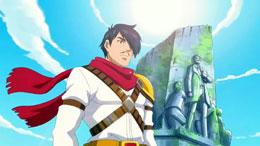Filipino heroes cast in digital fighting game

The elevator pitch for indie fighting game Bayani is simple: Street Fighter but with Filipino national heroes. Don’t be mistaken, though: Bayani isn’t a droll pseudo-educational game sanctioned by an education ministry.
Here, national hero José Rizal (whose prolific writings sparked the Philippine revolution in 1896) beats down his foes with a sword and blasts them with spells from a magical tome.
The country’s first prime minister, Apolinario Mabini, makes an appearance in the form of Rio, a character paralysed by polio but who utilises a “mysterious seedling” to free himself of his wheelchair (and of course, enabling him to float and fight telepathically).
Dre – based on Filipino revolutionary leader Andrés Bonifacio – returns to life as a bloodthirsty, Frankenstein-esque creature sewn together with parts of his dead brother’s corpse. Oria, another hero based on Bonifacio’s real-life wife Gregoria de Jesús, was resurrected by Dre using alchemy, causing the character to lose her sight.
Other historical figures, such as Spanish explorer Ferdinand Magellan, the man who brought Catholicism to the Philippines, and the “Grand Woman of the Revolution” Melchora Aquino, have cameos in Bayani – similarly rendered in striking, anime-inspired designs, with superpowers and outlandish backstories (explorer Fernando wants to find the Fountain of Youth at any cost; Lolang Tsora dabbled in forbidden magic to avenge her husband’s death).
They all come together to brawl in the fast-paced one-on-one fighting game, which has already made the rounds at several conventions since its 2016 announcement. Developed by Ranida Games, it is currently in early access on PC gaming portal Steam.
The world of Bayani is undoubtedly a wild one – punctuated by arcane magic, reincarnation and good-old fashioned fist fighting – but it’s a world steeped in Philippine history.
“We want the cast of Bayani to be their own characters that reference their real-life counterparts – and one of the best ways we can do that is through the gameplay,” said Benjamin Banta, studio head of Ranida Games, based in San Pedro, Laguna province.
Take the hero Joe, for example. “As José Rizal is a very intellectual man, Joe’s play style revolves around executing various strategies. This means that to use him properly, you’ll have to think two or three steps ahead of your opponent,” says Banta.
While Banta is careful to note that the characters in Bayani aren’t meant to be reincarnations of their real-life counterparts, he acknowledges that they serve as analogues for their historical figures, and are meant to serve as springboards to get people interested in the icons that inspired them.
“We think of it as a branch in history: if this or that happened, what would have been the consequence? How would it affect the revolution, and history as a whole?” said Banta.
Apart from its prolific historical cast, Bayani also features real places in the Philippines that have historical weight and ties to each of the characters. The Bagong Bayan stage, for instance, is based on the modern-day Rizal Park in Manila – where José Rizal was executed by firing squad.
Bayani also features a story mode for solo play.
The game’s story, according to Banta, “heavily references how the Philippines’ history unfolded … if it makes the player curious enough to learn what really happened, they will see some very obvious parallels”.
Most Filipinos grew up with a deep appreciation of these heroes, including Banta and his team at Ranida Games.
“Not only did we learn about them in school, but there were many TV shows and movies based on them,” says Banta. “It’s mandatory for all college students to study Rizal for one semester, so you can say that they were all part of our lives growing up.”
But Banta believes young Filipinos might be in need of a little refresher.
In 2015, historical knowledge among Filipino youth came under the spotlight after the launch of the historical biopic Heneral Luna. At a Q&A session, a student asked actor Epy Quizon – who portrayed paralysed statesman Apolinario Mabini in the film – why he never stood up from his chair during the film.
The question came as a surprise to many, who assumed that Mabini’s paralysis was common knowledge. Quizon later noted that the issue was “a reflection of how little some of the youth know about history”.
The fiasco sparked the idea for Bayani, says Banta. “People know about Japanese mythology, Roman mythology, Norse mythology and so on because they’ve been showcased many times in other games,” he says.
Banta says that he wants Bayani to do the same for the rich history of the Philippines. “Ever since we launched the game in early access last year, there have been a lot more questions and queries about the game’s characters and their inspirations.
“We see the community talking about which national hero the new characters are based on, what details reference real-life counterparts, and so on.
“The word ‘bayani’ is used for people who are martyrs, and those who sacrifice themselves for the greater good,” he says. “To be called a bayani in Tagalog is to be called more than just a hero,” says Banta. “You’re not being compared to some fantastical knight in shining armour who will slay the evil dragon – you’re being called this for your acts of valour, martyrdom and sacrifice.”






